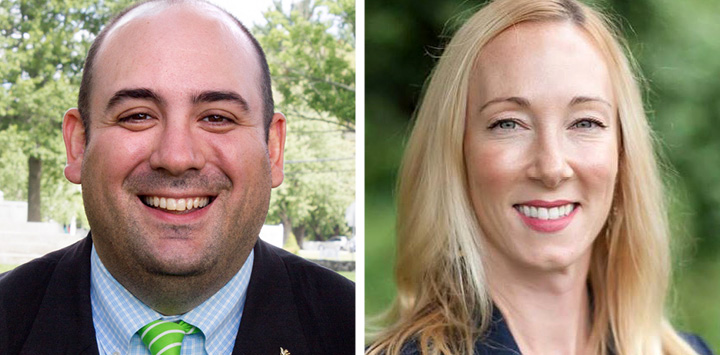Moderates Push Back Against Tax Hike Proposals

A coalition of moderate Democratic state lawmakers this week rejected calls by other members of their party for costly tax hikes, many targeting businesses.
The 25-member Moderate Democratic Blue Dog Caucus joined Gov. Ned Lamont and Democratic and Republican legislative leaders in urging fiscal restraint to protect the state’s fragile recovery from the pandemic.

Caucus co-chairs Rep. Pat Boyd (D-Pomfret) and Rep. Kerry Wood (D-Rocky Hill) released a statement Feb. 4 on behalf of caucus members.
“Now is not the time to increase the tax burden on the residents and businesses of the state of Connecticut,” the two said in the statement.
“Many families and small businesses are struggling because of COVID-19 and find it disheartening that the news coming from some legislators would directly affect their wallets.
“As a coalition, we are urging the Governor and our legislative colleagues to hold the line on taxes, take advantage of federal COVID relief funding, use caution when spending the rainy day fund, and continue to pay down our unfunded pension liabilities, which is the perennial burden on our budget process.”
$4 Billion Tax Hike Plan
The statement followed a proposal from progressive lawmakers released earlier in the week calling for $4 billion in tax hikes while overturning state spending limits.
Under that proposal, Connecticut’s top income tax rate would be the highest in the Northeast and the second-highest in the nation.
The plan also hikes the “temporary” corporate tax surcharge to 20%, raises base business tax rates, adds a 5% surcharge on capital gains, reduces the estate tax threshold, and imposes a statewide property tax on high-value properties.
The progressives’ spending proposals would shatter Connecticut’s statutory spending cap, designed to keep growth in line with increases in personal income or inflation.
“Extreme conditions call for extreme measures,” Rep. Robyn Porter (D-New Haven) said a Feb. 3 press conference promoting the tax hikes. “It is time for us to think outside of the box.”
Sen. Saud Anwar (D-East Hartford), Sen. Julie Kushner (D-Danbury), Rep. Brandon Chafee (D-Middletown), Rep. Kate Farrar (D-West Hartford), Rep. Jillian Gilchrest (D-West Hartford), Rep. Anne Hughes (D-Easton), Rep. Christine Palm (D-Chester), Rep. Quentin Phipps (D-Middletown), Rep. Travis Simms (D-Norwalk), Rep. Brian Smith (D-Colchester), Rep. Gary Turco (D-Newington), and Rep. Michael Winkler (D-Vernon) were among the other progressive caucus members who attended that press conference.
Senate President Martin Looney (D-New Haven) also introduced legislation earlier in the session that would impose a new statewide tax on residential and commercial property.
COVID-19 ‘Hell’
Lamont has made several recent public statements explicitly opposing tax hikes, citing the state’s fragile economy and the failure of past increases.
“To be blunt, I have no interest in raising taxes—no broad-based tax increases,” he told more than 220 business leaders Jan. 22 at CBIA’s Economic Summit + Outlook 2021.
“Every governor, Republican or Democrat since—or including—Lowell Weicker has done that and it did not solve the problem.
“To be blunt, I have no interest in raising taxes.”
Gov. Ned Lamont
“I know the hell that people are going through during this COVID pandemic.”
Speaking at the same event, House Majority Leader Jason Rojas (D-East Hartford) said not increasing taxes on businesses was among his priorities this legislative session, “so they can continue to grow, which results in increased revenue for the state.”
Rojas, Boyd, and Wood are among the 55 lawmakers from both major parties who signed CBIA’s Rebuilding Connecticut policy pledge—a roadmap for driving the state’s economic recovery.
Fiscal Restraint
“When we have money in the bank, the last thing we should be leading with is increasing the tax burden on people,” Wood said in the moderate caucus’ Feb. 4 statement.
“Instead, we have our economy to make a priority, so let’s reinvest in Connecticut’s growing biotech and manufacturing sectors and expand workforce training.”
“We must continue to get our fiscal house in order to position Connecticut for future success.”
Rep. Pat Boyd
Boyd noted that bipartisan collaboration shaped the 2017 implementation of spending, bonding, and volatility caps, key factors behind the current historic high balance of Connecticut’s rainy day fund.
“The direct result of those structural changes has put Connecticut in a position to have a robust rainy day fund, a budget surplus, and improved bond rating,” he said.
“We must continue to get our fiscal house in order to position Connecticut for future success. Breaking the spending cap is a non-starter and a step backward from the work we have done in previous years to stabilize Connecticut.”
ModStatementonTaxesFor more information, contact CBIA’s Eric Gjede (860.244.1931) | @egjede
RELATED
EXPLORE BY CATEGORY
Stay Connected with CBIA News Digests
The latest news and information delivered directly to your inbox.


